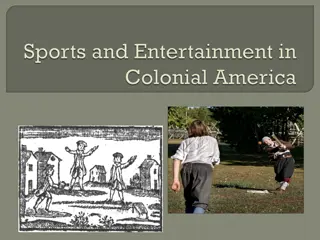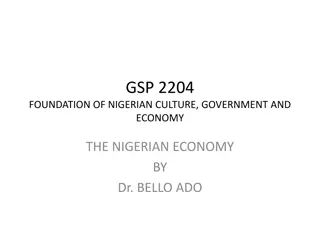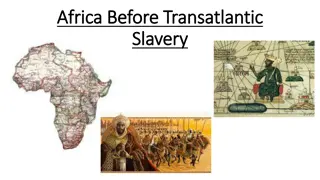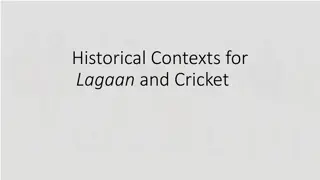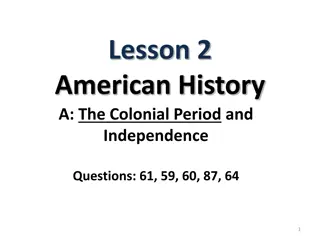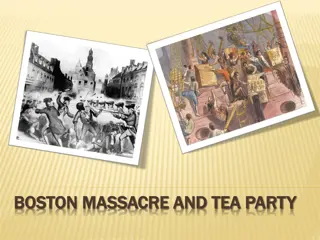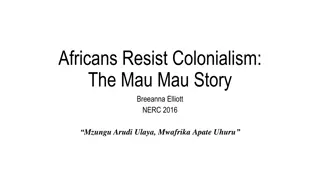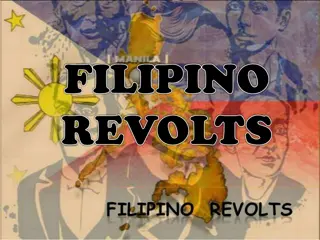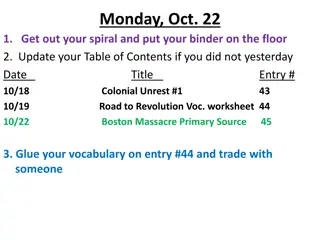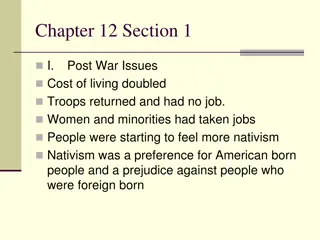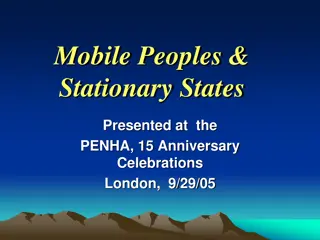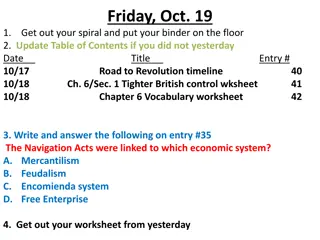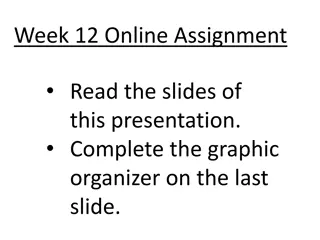State Evolution in Africa: Political Development & Modernization
Delve into the trajectory of African states, examining colonial legacies, challenges to statehood, and the shift to modern governance structures. Explore the pivotal role of states in international and internal politics in Sub-Saharan Africa. Analyze the attributes and functions of modern states, fr
0 views • 26 slides
Unrest and Uncertainty: Post-Election Turmoil in Pakistan
The recent national elections in Pakistan have sparked controversy and unrest, with former prime ministers Imran Khan and Nawaz Sharif both claiming victory amidst allegations of voter fraud and political restrictions. The country faces economic challenges, internal insurgencies, and strained intern
8 views • 5 slides
Colonial Acts and Conflicts in American History
Key historical events such as the French & Indian War, the Proclamation of 1763, and the Quartering Act are explored, shedding light on critical laws, conflicts, and tensions that shaped colonial America. The discussion covers acts imposed by the British government, the impact on settlers and Native
5 views • 15 slides
Attitudes Toward Sports Among Colonial Settlers in the New World
The attitudes of European colonial settlers towards sports in New England, the Middle Colonies, and the South were deeply influenced by their religious backgrounds. While Puritans in New England were generally against play, Quakers and Dutch Calvinists in the Middle Colonies were more accepting. In
0 views • 19 slides
Understanding House Styles: A Brief Overview
House styles encompass a variety of architectural designs, with buildings classified based on shared characteristics like roof shape, window placement, and construction materials. Early American house styles, such as American Colonial, reflect the diverse origins of settlers in North America. Coloni
3 views • 25 slides
Architecture in Colonial India: A Blend of Cultures
British Colonial architecture in India during the 17th to 20th centuries combined Hindu, Islamic, and Western elements, leading to the unique Indo-Saracenic style. This architectural era saw the construction of institutional and civic buildings showcasing a mix of Gothic, Neo-Classical, Indo-Islamic
0 views • 9 slides
Evolution of Medicine in Colonial South Asia
The evolution of medicine in colonial South Asia witnessed a transition from local traditional practices to the dominance of imported European medicine. This shift, marked by the establishment of imperial institutions and training of local physicians in Western techniques, led to a complex interplay
1 views • 5 slides
Indigenous Economy of Pre-Colonial Nigeria
The indigenous economy of pre-colonial Nigeria was characterized by agriculture, local industries, crafts, trade, and services. Agriculture was the primary activity, with various crops grown and other occupations like hunting and fishing. Local industries included weaving, pottery, blacksmithing, an
0 views • 22 slides
Language Controversy and Political Awakening in Colonial India
Urdu-Hindi language controversy in colonial India sparked a significant cultural and political divide between Hindus and Muslims, leading to the emergence of the Two-Nation Theory. This controversy, along with events like the formation of the Indian National Conference, highlighted growing tensions
0 views • 45 slides
Understanding Uganda's Pre-Colonial History through Major Sam Emoit's Presentation
Delve into the pre-colonial history of Uganda as presented by Major Sam Emoit, Chief Instructor at the School of Military Intelligence and Security. Explore the way ancestral Ugandan communities lived, their tools, social patterns, and interactions before colonial rule. Discover the diverse methods
0 views • 127 slides
Education in Colonial Times: A Historical Overview
Education in colonial times varied across different regions in America. The Northern colonies emphasized education with schools like Harvard College, while the South lacked formal education laws pre-Civil War. In the middle colonies, education was deemed important but left to families until laws wer
0 views • 10 slides
Evolution of Colonial Architecture in British India
The British Colonial era in India spanned over three centuries from 1615 to 1947, leaving a lasting impact on the country's architecture. The fusion of Hindu, Islamic, and Western elements gave rise to the distinctive Indo-Saracenic style, showcased in various institutional and civic structures. Exp
0 views • 16 slides
Exploration of Colonial Discourse in George Orwell's "Shooting an Elephant
George Orwell's "Shooting an Elephant" delves into the psychological conflict of a police officer upholding British imperial rule in Burma. The narrative unravels Orwell's ambivalence towards colonialism, his struggles with authority and identity, and the complexities of power dynamics and moral res
5 views • 17 slides
Welcome to Colonial Cafe Orientation
Explore the comprehensive orientation agenda at Colonial Cafe, covering essential topics such as company history, mission, job expectations, benefits, and training. Learn about the Cherry System, growth opportunities, and the company's commitment to providing excellent service and quality food. Get
0 views • 28 slides
History of Malaysia: From Pre-history to Colonial Rule
Malaysian history traces back to the migration of Proto-Malays from China, development of trade ports, adoption of Buddhism, Hinduism, and Islam, the rise of the Malacca Sultanate, and European colonial rule by Portugal and the Dutch. The region's rich history is marked by cultural exchanges, trade
0 views • 12 slides
Understanding Colonialism and Imperialism in Modern History
The discussion revolves around the impact of colonialism and imperialism on international relations, focusing on the historical context, economic consequences, and nationalist movements against colonial powers. Highlighting key players such as Great Britain, France, and Germany during the 19th centu
2 views • 14 slides
Flourishing Civilizations of Pre-Colonial Africa
Explore the rich history of pre-colonial Africa that dispels misconceptions of African inferiority. Discover the advanced civilizations of Egypt, Ghana, Benin, Mali, and Songhay, showcasing achievements in science, technology, trade, and governance.
1 views • 8 slides
American Colonial History and Representative Government Study Guide
Study guide for American colonial history and representative government covering topics such as Colonial Culture, the Great Awakening/Enlightenment, Ben Franklin, and Roots of Representative Government including Magna Carta, Parliament, English Bill of Rights, Glorious Revolution, salutary neglect,
0 views • 4 slides
Colonial Culture and The Great Awakening: Overview and Impact
This content covers activities and notes related to Colonial Culture, Native Americans, Colonists, and the African American community. It also delves into the Great Awakening and Enlightenment period, discussing the religious movement in the 1730s-1740s. Traveling ministers, such as Jonathan Edwards
0 views • 13 slides
Women's Challenge in Colonial & Revolutionary Periods
Explore how women challenged government practices in colonial and revolutionary times through actions like the Edenton Tea Party organized by Penelope Barker and petitions against the Tea Act. Uncover their subtle but significant contributions to shaping the course of history.
0 views • 13 slides
Unveiling Historical Contexts of Lagaan and Cricket in Colonial India
Explore the intricate historical contexts of the film "Lagaan" and the sport of cricket in colonial India. Delve into the political history, princely India dynamics, class, caste, region, religion complexities, and the economic significance in the British Empire's rule. Unveil the interplay of racis
0 views • 6 slides
Exploring American Colonial History Through Images
Explore the early American colonial period and independence through a collection of visual resources depicting key events such as Christopher Columbus's exploration, the first colonies in Jamestown, interactions between colonists and Native Americans, Thanksgiving celebrations, and political develop
0 views • 36 slides
European Colonial Encounters 1750-1914: Paths to Imperialism
Second wave European conquests in the 18th and 19th centuries saw a shift towards informal control and military force in establishing empires in Africa and Asia. Various paths to colonial status emerged in India, Indonesia, Australia, and New Zealand, reflecting different colonization methods and ou
0 views • 21 slides
The Pullman Strike of 1894: Eugene Debs and Labor Unrest
The Pullman Strike of 1894 was a pivotal event in American labor history, led by Eugene Debs and the American Railway Union against the Pullman Company's unfair labor practices. Workers protested wage cuts and living conditions, sparking a nationwide strike that disrupted rail traffic. Despite facin
0 views • 18 slides
Colonial Resistance and Key Events in American History
Explore the growing colonial resistance during the Townshend Acts, the Writ of Assistance, the Boston Massacre, and the Boston Tea Party. Learn about key figures like Samuel Adams, John Adams, and Crispus Attucks who played significant roles in the fight against British taxation and injustice in the
0 views • 9 slides
Growing Colonial Resistance and Tensions in America
Colonial resistance in America escalated with the Townshend Acts, protests, the Boston Massacre, the Tea Act, and the formation of Committees of Correspondence. Tensions between the colonists and British authorities further intensified as acts of rebellion and British responses fueled the flames of
0 views • 7 slides
Unrest in Colonial America: The Boston Massacre, Tea Party, and Growing Tensions
Discontent brewed in Colonial America as the Boston Massacre, Tea Party, and clashes with British troops fueled anger among colonists. The escalation led to boycotts, propaganda, and resentment towards Britain, culminating in the Tea Act and colonies' defiance.
0 views • 12 slides
The Crisis Begins: Impact of the Stamp Act and Colonial Resistance
The Crisis Begins Chapter from "Give Me Liberty!" discusses the repercussions of the 7 Years War and the end of salutary neglect, leading to new trade regulations and increased taxation on colonists. The imposition of the Stamp Act without colonial consent sparked widespread resistance, with the eme
0 views • 14 slides
The Mau Mau Uprising in Kenya: A Struggle for Independence
The Mau Mau Uprising in Kenya, also known as the Mau Mau Rebellion, was a significant resistance movement against British colonial rule. Initiated by the Kikuyu ethnic group but involving various tribes, it was fueled by grievances over land dispossession and mistreatment. The rebellion escalated in
0 views • 9 slides
Understanding Bacterial Colony Morphology for Microbiology Analysis
Bacterial colonial morphology plays a crucial role in identifying bacteria and fungi. This exercise focuses on recognizing the cultural characteristics of bacteria on agar plates through colony morphology. Each colony represents a genetically similar group of microorganisms derived from a single cel
0 views • 6 slides
Filipino Revolts Against Spanish Colonial Rule in the Philippines
The Filipino revolts against Spanish colonial rule in the Philippines were driven by various causes such as the desire to regain lost freedom, Spanish oppression, hated tribute, forced labor, religious persecution, agrarian disputes, and more. These revolts occurred at different times in various reg
0 views • 15 slides
Decolonial Critique of Colonial Violence and Epistemology
This content explores decolonial critiques of colonial projects, Western epistemology, DTM epistemology, and the implications of hiding ethics in knowledge production. It delves into the concepts of extreme violence, morality, and the normalization of violence in the context of colonialism and oppre
0 views • 18 slides
Reflections on Colonialism and Cultural Domination
The texts by Jean-Paul Sartre and Frantz Fanon provide deep insights into the dynamics of colonialism and cultural imperialism. Sartre discusses the manipulation of native elites by European powers, while Fanon delves into the psychological impacts on colonized individuals. Both authors highlight ho
1 views • 14 slides
American Colonial Unrest and Revolutionary Actions
American colonies faced a series of challenges and oppressive acts from the British government, triggering unrest and paving the way for revolutionary actions. This period saw events such as the Proclamation Line of 1763, Quartering Act, Stamp Act tax, and the formation of groups like the Sons of Li
0 views • 15 slides
Post-War Issues: Nativism, Red Scare, and Labor Unrest in the 1920s
The 1920s saw a rise in nativism, with Americans feeling threatened by job competition from women and minorities. The era was marked by the Red Scare, fueled by fears of communism spreading globally, leading to the formation of the Ku Klux Klan. The Quota System was implemented to limit immigration,
0 views • 7 slides
European Colonial Competition in East Africa
The division of African territories by European powers, such as Britain, France, and Italy, led to conflicts and negotiations in the Horn of Africa. Menelik, an African leader, challenged European colonialists, resulting in the famous Battle of Adwa. The aftermath of the battle saw a shift towards n
0 views • 25 slides
Colonial Rebellions and Reactions in Early America
The Colonial Rebellions in early America, such as Bacon's Rebellion and the Stono Rebellion, exemplified the growing tensions and conflicts within the colonial society. These uprisings highlighted issues of class struggle, disparity in social status, and led to significant consequences such as the f
0 views • 7 slides
Colonial Challenges Under British Rule
In this academic material, students are instructed to update the Table of Contents and engage with resources related to tighter British control over the colonies. The tasks include exploring historical events like the Proclamation Act of 1763, Quartering Act, Sugar Act, Stamp Act, Declaratory Act, a
0 views • 18 slides
Causes of the French Revolution and Economic Factors Leading to Unrest
The French Revolution was fueled by a combination of political, social, and economic factors. Political causes included royal incompetence, denial of voice in government, and unpopular monarchs like King Louis XVI and Marie Antoinette. Social causes stemmed from the vast inequality among the three e
0 views • 14 slides
Cultural Contrasts in Colonial Texas - Anglos vs Mexicans
The cultural differences between Anglos and Mexicans in Colonial Texas were evident through contrasting perspectives on power structures, military involvement, slavery, and governance. Anglos advocated for civilian rule and believed in the military serving the people, while Mexicans emphasized power
0 views • 6 slides



